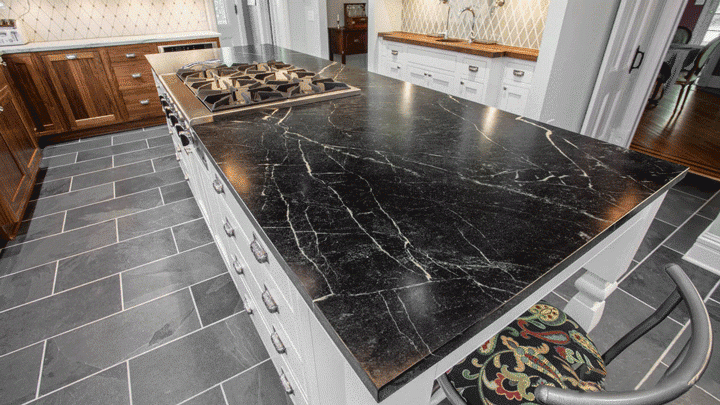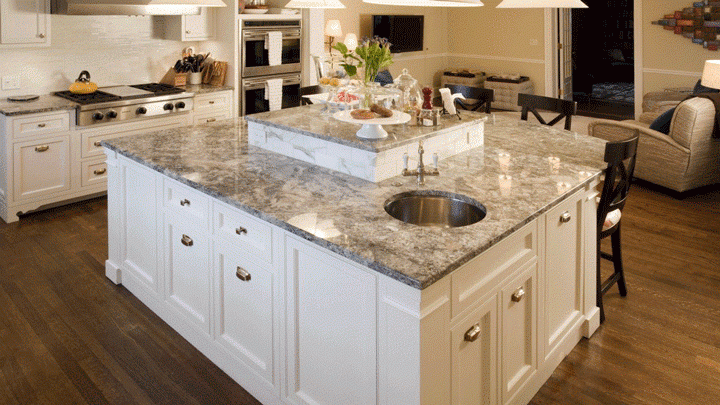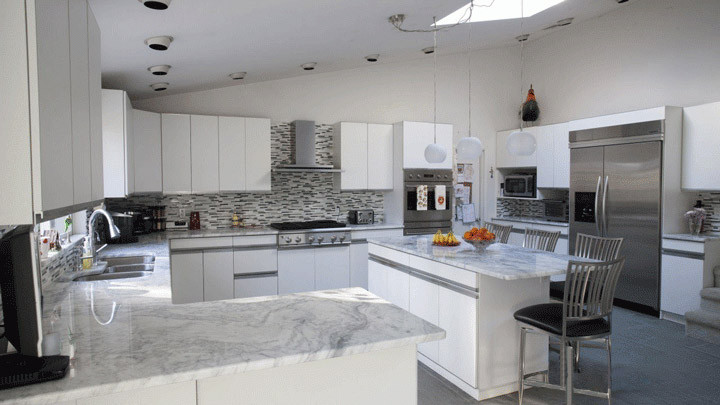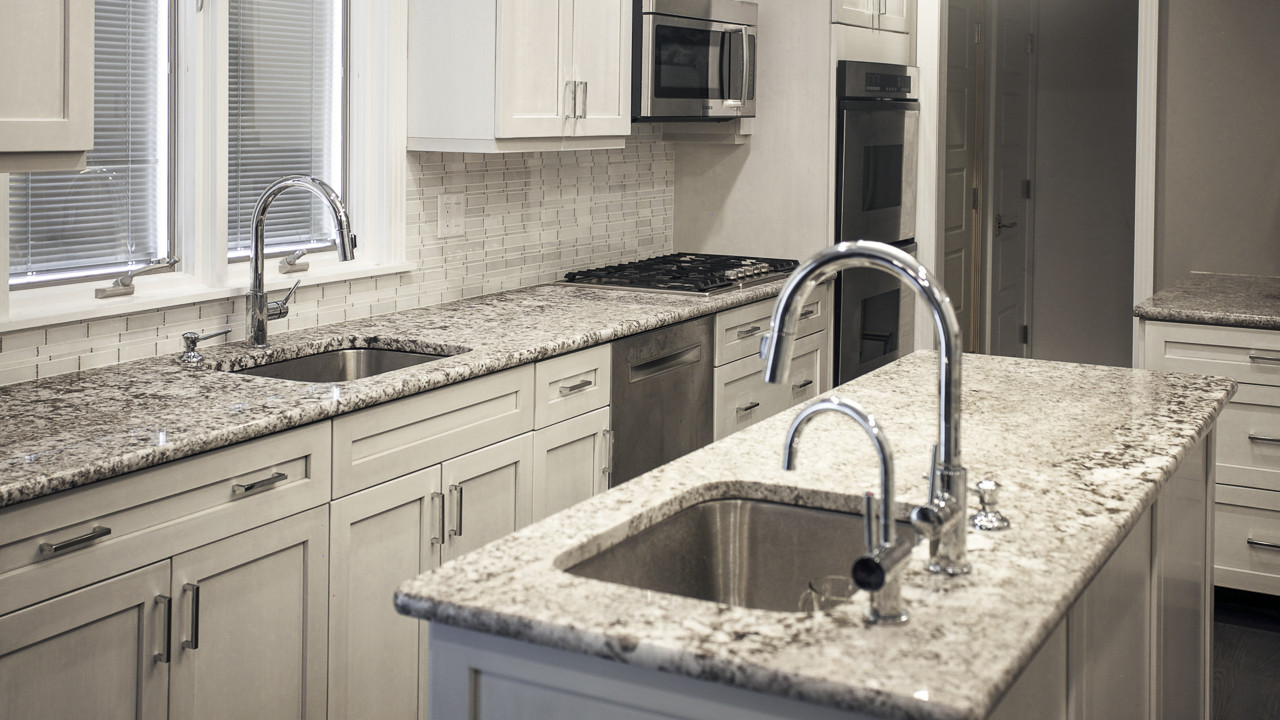
Table of Contents
Soapstone is a beautiful natural stone that is commonly used as a building material. Beyond countertops, soapstone has often been used to carve sculptures because of the soft nature of the material. However, the soapstone used to carve sculptures is much softer than the type that is used to build countertops, so you can set aside any fears regarding the strength of the countertops. This guide will highlight the cost of soapstone countertops as well as other information you need to know before making the decision to purchase.
[get_quote]
What is Soapstone?
Soapstone, also known as steatite, is a metamorphic rock that is formed by a combination of talc and other minerals. The name soapstone was given to this stone because of the way it feels. Many compare the feeling to touching a dry bar of soap.
The talc content in soapstone will determine how hard or soft it is. Soapstone with higher amounts of talc present will be softer, and therefore more suitable for uses like carving. On the other hand, soapstone with lower amounts of talc present will be more suitable for building structures like countertops. The outermost layer of the famous Christ the Redeemer statue in Rio de Janeiro is made of soapstone.
Beyond being used as a building material, soapstone has many other interesting uses. The stone is used in the form of “whiskey stones” to cool down beverages without diluting them. It was also used by ancient civilizations to build items such as bowls and pipes, among many other items.
Types of Soapstone
As mentioned above, there are two different types of soapstone. These two types are referred to as Artistic Soapstone and Architectual Soapstone. Artistic Soapstone has a very high talc content; often times the talc content in Artistic Soapstone is upwards of 80 percent. On the flip side, Architectual Soapstone is harder than its Artistic counterpart, with a talc content of between 50 to 75 percent.
What Color is Soapstone?
Soapstone can be found in a range of greys. Different types are lighter or darker and can include hints of blue, green and black. The color of soapstone naturally darkens over time, developing a distinct patina that many homeowners find charming. If you want to speed up the process, you can treat your soapstone countertops with mineral oil to darken the surface.
How Much Do Soapstone Countertops Cost?
In general, soapstone countertops tend to cost between $55 to $100 per square foot, depending on what type you choose, how difficult the installation process is and how much of the stone you need for your new countertop. Below is a breakdown of the lowest, average and highest costs of soapstone countertops.
| Lowest Cost | $55 per square foot |
| Average Cost | $65 per square foot |
| Highest Cost | $100 per square foot |
How Does the Price of Soapstone Compare to Other Countertop Options?
Soapstone prices tend to fall somewhere near the middle of a range of common countertop options. The price ranges are depicted in the table below.
| Granite | Between $35 to $75 per square foot |
| Marble | Between $40 to $100 per square foot |
| Quartz | Between $50 to $120 per square foot |
| Slate | Between $50 to $200 per square foot |
| Soapstone | Between $55 to $100 per square foot |
| Limestone | Between $70 to $200 per square foot |
| Onyx | Between $75 to $250 per square foot |
| Gemstone | Start around $100 per square foot |
What Are the Pros and Cons of Soapstone Countertops?
Soapstone countertops come with both pros and cons. These pros and cons are explained in detail below.
| Pros | Cons |
|---|---|
| Color | Color |
| Non-porous | Scratches Easily |
| Heat Resistant | Visible Seams in Large Countertops |
| Erosion Resistant | Cost |
Pros
Color
As explained above, soapstone naturally darkens with age, or you can treat it with mineral oil to speed up the process. This is a pro for some homeowners, while it is a con for others. Many homeowners who view this as a pro feel that the natural darkening makes the countertops look distinctive and charming.
Non-porous
One of the major benefits you will receive from a soapstone countertop is that the surface is non-porous. This is not very common in natural stones and can be seen as a major advantage by many homeowners. Because soapstone is not porous, it will not require the sealing that most other natural stone countertops do.
Heat Resistant
Another major benefit of soapstone is the material’s heat resistant properties. This makes soapstone a perfect choice for the kitchen, as setting down hot pots and pans on the surface of the countertop will not cause any damages the way it would with many other surfaces.
[get_quote]
Erosion Resistant
Soapstone is often used in science labs because of its ability to withstand contact with acids. This reason is also helpful in the house, as soapstone will not wear down due to spills of acidic substances like orange juice or coffee.
Cons
Color
While the color of soapstone is a pro for many, if you do not want your countertop to darken over time, soapstone will not be the right choice for you. Even if you do not treat the countertop with mineral oil, it will always naturally darken with age.
Scratches Easily
One of the major drawbacks to soapstone countertops is that the surfaces scratch easily. Make sure not to cut directly on the surface with a knife. Although you do not want to scratch your soapstone countertop, any minor scratches can be sanded out. In addition, soapstone countertops chip relatively easily, so you will need to be careful when handling any heavy objects around the surface.
Visible Seams in Large Countertops
Soapstone is quarried in smaller slabs. Because of this, any countertops longer than 7 feet will have visible seams. To try to combat this, you can see if seams can be placed in an inconspicuous spot.
Cost
Soapstone is not necessarily expensive when compared to many other countertop options, but it is not cheap either. You will have to pay a decent amount to get soapstone countertops, so be prepared. If your budget allows, you should not let the cost hold you back from getting the surface you want. Buying a new countertop in likely a one-time investment, so you want to make sure you get something you will be satisfied with.
Durability of Soapstone Countertops
Soapstone countertops are a very durable surface. Since the material is non-porous, you will not have to worry about stains and having to seal the countertop. As explained in the Pros section, soapstone countertops are also resistant to both heat and acidic substances.
Maintenance of Soapstone Countertops
Soapstone countertops do not require sealing like many other natural stone countertops do. To clean the surface, you can use any common household cleaner. However, if you are treating your soapstone countertop with mineral oil, you should clean it using just soap and water. If you use harsh cleaners, they may remove the mineral oil and you will have to re-apply it. If your countertop does incur minor scratches, they can be easily sanded out.
Installation of Soapstone Countertops
Although they are a little lighter than other natural stone countertop surfaces, you still should not attempt to install soapstone countertops on your own. Granted, you will have to pay to have the countertops professionally installed, but it will be well worth the cost. Having your soapstone countertops professionally installed will reduce the risk of any damages occurring during installation. In addition, you will not be risking any injury to yourself if you do not attempt to install them.
Resale Value
Soapstone, much like other natural stone countertops, has a high resale value. Many prospective homeowners love the idea of having soapstone countertops, as the material is attractive, durable and easy to care for. Having soapstone countertops may be one of the most desirable features when the time comes to sell your home.
How Does Soapstone Compare to Other Natural Stone Countertop Options?
When looking for countertops, you will have many natural stone options to choose from. Two of these primary options are granite and marble. Below is a comparison of how soapstone countertops compare to both granite countertops and marble countertops.
[get_quote]
How Does Soapstone Compare to Granite?
Granite is one of your top natural stone countertop options on the market. The stone is attractive, durable and is resistant to heat. In these ways, granite is similar to soapstone. On average, granite tends to be a little more affordable than soapstone, though some overlap in pricing exists. One advantage that you may find with granite is additional color options. Granite comes in many different colors and patterns, while soapstone can only be found in shades of grey. Soapstone and granite both have a high resale value.
How Does Soapstone Compare to Marble?
Marble is another top natural stone countertop option. However, there are more differences between soapstone and marble than there are between soapstone and granite. Marble, like granite, will offer more color and pattern options than soapstone. But soapstone has a major advantage over marble in terms of maintenance. Soapstone does not need to be sealed, while marble must be re-sealed every few months to keep it looking in top shape. Marble also tends to come at a slightly lower cost than soapstone. Both are heat resistant and have a high resale value.
There are many good reasons to invest in soapstone countertops. Not only are the surfaces beautiful, but they will also come with many functional benefits. If you are looking for kitchen countertops, or any countertops for that matter, soapstone should be one of your top considerations. If you are not looking for dark countertops, soapstone is not the right fit for you. But if you are, purchasing soapstone countertops can be one of the best decisions you ever make. Before you purchase any countertop, regardless of the material, you should make sure that you do proper research beforehand. If you choose to go with soapstone, your new countertops can be a welcoming focal point of your home for years to come.
















 The article helped me immensely
The article helped me immensely
 I’m now more informed on the subject
I’m now more informed on the subject
 I have questions about Marble.com
I have questions about Marble.com
 The article was not accurate at all
The article was not accurate at all
 There is a serious lack of information
There is a serious lack of information
 I have questions about Marble.com
I have questions about Marble.com